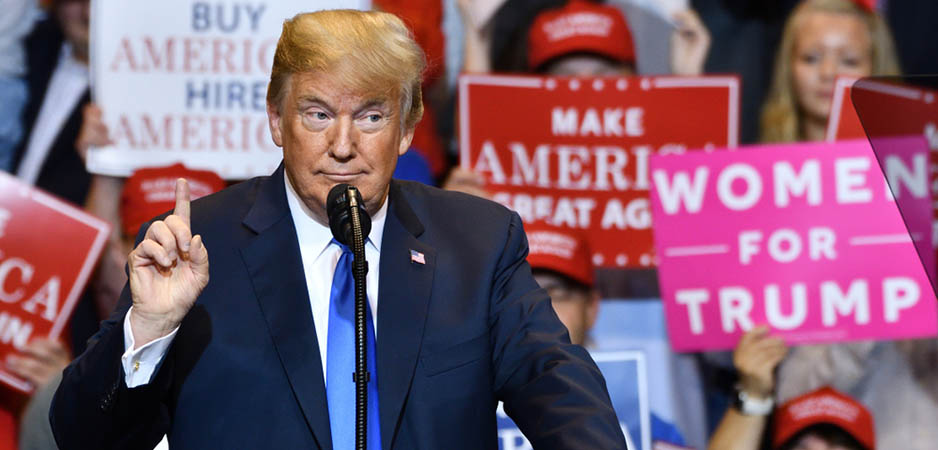In a speech ahead of the midterm elections, Donald Trump admitted to being a nationalist. What does this mean for America?
At a political rally on October 22 for the upcoming midterm elections, US President Donald Trump declared himself a “nationalist.” Trump’s nationalism operates through notions of an “authentic,” rooted and morally good nation that is re-enforced in relation to migrants and minorities. Such exclusionary nationalism, also referred to as nativism, is an ideology or discursive repertoire which holds that states should be inhabited by members of the native group (the “nation”), and that non-native people and ideas are fundamentally threatening to the homogenous nation-state.
At the heart of the nationalism propagated by Trump lies the idea that America is threatened by internal and external “others.” During the 2016 US presidential campaign, it was Trump’s top aide, Steve Bannon, who “embodied” the defiant nationalism at the core of the candidate’s agenda. The idea promoted was that the nation was threatened by progressive, corrupt elites and radical Islam.
On the campaign trail, Trump ran for president calling for a temporary ban on Muslims. He vilified Mexicans as drugs dealers and rapists, invoking the image of vulnerable white women attacked by men of color. At rallies, he invited on stage white mothers of children killed by undocumented migrants. To portray the nation as one of women raped by foreign men is a powerful image to invoke in calls for defending the country’s borders against invasion and violation.
Two years later, while Bannon has been estranged from the White House, there are still clear continuities in the terms and tropes he popularized. At the rally in Houston in support of Republican Senator Ted Cruz’s re-election campaign, Trump effectively nurtured violent imaginaries of hordes of foreigners that would overrun the US if “radical” Democrats with an “extremist immigration agenda” gain power. In a nationalist discourse, migrants were framed unilaterally as criminal threats to national sovereignty, security and safety.
Migrants from Central America traveling to the US-Mexico border are now Trump’s rhetorical targets. The president claimed that amongst the “illegal aliens” in the migrant caravan were some “very bad people.” Furthermore, he referred to crime committed by migrants, ascribing potential violent and criminal qualities to whole categories of people.
Trump routinely marks his opponents as enemies of the people — whether they are “fake news” or “radical Democrats.” The term “globalist” has become integral to his rhetorical repertoire.
The president plays with ambiguity when he states that the “corrupt, power-hungry globalists” put the rest of the world’s well-being ahead of the nation’s. The term “globalist,” while it can refer to someone in support of globalization, has traditionally carried strong anti-Semitic connotations. Amongst far-right actors, “globalist” is routinely used as a way to denote Jewish people. In particular, George Soros, the American-Hungarian investor of Jewish background, is demonized in far-right discourse in traditionally anti-Semitic terms — as an evil and dangerous “globalist” who is destroying nation-states through his support for liberal immigration policies and open societies.
 Trump’s warning of a nation endangered by migrants and globalists not only conveys a message of alarm, but also a call to reinforce territorial boundaries and “put America first” as his nationalist slogan goes. He promises to protect the US economy, culture and traditions anchored in Christian values. The greatness of the nation can only be restored through the “rootedness” of family, religion and traditions. Combined with a strong, exclusionary rhetoric against migrants and minorities — in particular Muslims — as criminal threats, Trump reinforces the ethno-national boundaries of the nation imagined as Christian and white.
Trump’s warning of a nation endangered by migrants and globalists not only conveys a message of alarm, but also a call to reinforce territorial boundaries and “put America first” as his nationalist slogan goes. He promises to protect the US economy, culture and traditions anchored in Christian values. The greatness of the nation can only be restored through the “rootedness” of family, religion and traditions. Combined with a strong, exclusionary rhetoric against migrants and minorities — in particular Muslims — as criminal threats, Trump reinforces the ethno-national boundaries of the nation imagined as Christian and white.
Flirting with racializing rhetoric and imaginaries is of course not new, and these have existed in both far-right and mainstream politics throughout the century. Terms like “America first” and “globalist” play upon older, racialized discursive traditions and is why they are so powerful affective structures to invoke in political mobilization. However, by endorsing nationalist rhetoric and dehumanizing images of others, Trump not only inflames far-right constituencies. He also moves exclusionary nationalism from the margins to the mainstream. Moreover, dehumanizing migrants and minorities to turn fear into votes is a dangerous strategy that, as history has shown, can have fatal human consequences.
The views expressed in this article are the author’s own and do not necessarily reflect Fair Observer’s editorial policy.
Support Fair Observer
We rely on your support for our independence, diversity and quality.
For more than 10 years, Fair Observer has been free, fair and independent. No billionaire owns us, no advertisers control us. We are a reader-supported nonprofit. Unlike many other publications, we keep our content free for readers regardless of where they live or whether they can afford to pay. We have no paywalls and no ads.
In the post-truth era of fake news, echo chambers and filter bubbles, we publish a plurality of perspectives from around the world. Anyone can publish with us, but everyone goes through a rigorous editorial process. So, you get fact-checked, well-reasoned content instead of noise.
We publish 2,500+ voices from 90+ countries. We also conduct education and training programs
on subjects ranging from digital media and journalism to writing and critical thinking. This
doesn’t come cheap. Servers, editors, trainers and web developers cost
money.
Please consider supporting us on a regular basis as a recurring donor or a
sustaining member.
Will you support FO’s journalism?
We rely on your support for our independence, diversity and quality.





